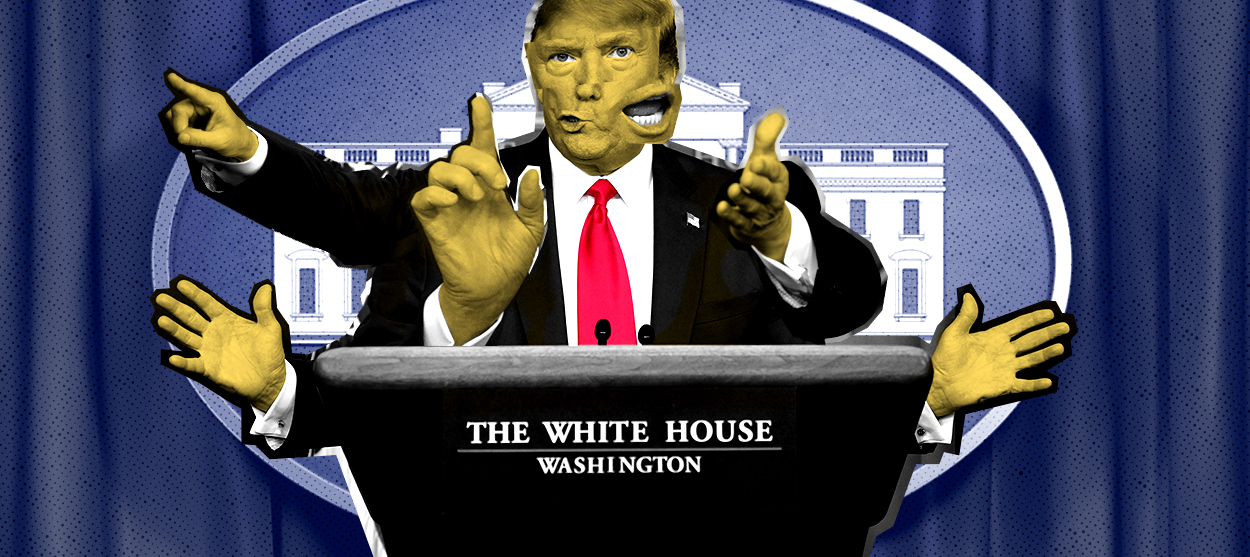Trump's contradictory immigration order


If conventional political wisdom is that a leader should never let a crisis go to waste, it follows that a crisis will reveal a leader's true priorities. In the midst of the coronavirus pandemic, Donald Trump's focus couldn't be more clear.
On Wednesday, Trump signed an executive order that bars most forms of immigration to the United States for the next 60 days. While not an outright ban on legal immigration, Trump's executive order is the culmination of what has been a set of increasingly restrictive immigration policies put out by his administration since COVID-19 began. All along, Trump and his allies have defended these restrictions primarily as sensible health measures, meant only to protect Americans from infection-carrying outsiders.
At the same time, those very voices, particularly the president, seriously downplayed the health consequences of coronavirus even as it ravaged the country and has killed, thus far, more than 50,000 Americans. The latest extreme immigration decision by Trump this week took place just as he was also ramping up his latest push to end the lockdowns and reopen the American economy, despite public health officials warning of the potentially deadly consequences from doing so. The blatant hypocrisy of ignoring experts' health warnings while using supposed health concerns as the basis for limiting immigration is trademark Trump doublespeak, of course, and not surprising from a man who regularly contradicts himself even while he's speaking.
The Week
Escape your echo chamber. Get the facts behind the news, plus analysis from multiple perspectives.

Sign up for The Week's Free Newsletters
From our morning news briefing to a weekly Good News Newsletter, get the best of The Week delivered directly to your inbox.
From our morning news briefing to a weekly Good News Newsletter, get the best of The Week delivered directly to your inbox.
Perhaps more than anything else, it starkly demonstrates how much the coronavirus for Trump is simply a political football rather than a real and urgent crisis. If the virus is serious enough to suspend immigration, then the economy shouldn't be reopened. Yet the cruel contradiction in simultaneously advocating for both underscores how unserious Trump and his lackeys are about the gravest threat this country has faced since 9/11.
It's no wonder Trump has seized on the pandemic to escalate his anti-immigration agenda. In normal times, accusing immigrants of bringing disease, crime, and economic woes to the country offers his impassioned supporters the reddest meat to feed their ravenous resentments. Now, during a health emergency that Trump is both incapable of understanding and uninterested in managing, Trump's anti-immigration rhetoric, amplified by his favorite propaganda mill, Fox News, serves as a convenient distraction from how disastrously he has mishandled the crisis while also setting in motion what is sure to be one of the dominant narratives of his re-election campaign. Coupled with the xenophobic blaming of China for the coronavirus, Trump is counting on racist messaging to divert from his shortcomings and reignite his followers' fantasies.
But it's not just mere talk. Since early March, the Trump administration has diligently made more than a dozen changes to the U.S. immigration system, including delaying immigration hearings, suspending refugee admissions, closing large sections of the southern border with Mexico, and ordering the immediate removal of any migrants, including children, found crossing the border, among other measures. Beyond the issue of immigration, the Trump administration and Republicans have, while everyone else has been paying attention to COVID-19, snuck through drastic rollbacks to existing environmental regulations and, as Jeffrey Toobin reported in the New Yorker, put LGBTQ rights in their crosshairs.
The contrast between these quiet, almost hidden, efforts and the loud broadcasting of the immigration changes, including Trump's tweeting about them, reveals how much the president understands that anti-immigrant fervor fuels his partisans' passions. And the swift efficiency with which all of this is being done only further highlights how slowly and ineptly Trump has moved on coronavirus.
A free daily email with the biggest news stories of the day – and the best features from TheWeek.com
In justifying this week's executive order, Trump said he was suspending immigration to protect American jobs from being taken by outside workers, a change from his earlier arguments that any immigration restrictions were designed to lessen the health threat immigrants posed to Americans. With more than 26 million Americans filing jobless claims and with a good chunk of Trump's core backers and boosters still questioning the legitimate danger of coronavirus, it's not a mystery why Trump has shifted from a health-based justification to an economic rationale for his immigration order. But it also points to how malleable Trump's general anti-immigration message is to whatever serves him best at the moment.
Whether he characterizes them as deadly to American lives or destructive to the nation's economy, Trump constantly scapegoats immigrants for America's problems, especially those of his own making. Still, no matter how many people he keeps out of the country, it won't do one thing to curb the sickness that is raging within.
Want more essential commentary and analysis like this delivered straight to your inbox? Sign up for The Week's "Today's best articles" newsletter here.
Neil J. Young is a historian and the author of We Gather Together: The Religious Right and the Problem of Interfaith Politics. He writes frequently on American politics, culture, and religion for publications including The New York Times, The Atlantic, the Los Angeles Times, HuffPost, Vox, and Politico. He co-hosts the history podcast Past Present.
-
 Europe’s apples are peppered with toxic pesticides
Europe’s apples are peppered with toxic pesticidesUnder the Radar Campaign groups say existing EU regulations don’t account for risk of ‘cocktail effect’
-
 Political cartoons for February 1
Political cartoons for February 1Cartoons Sunday's political cartoons include Tom Homan's offer, the Fox News filter, and more
-
 Will SpaceX, OpenAI and Anthropic make 2026 the year of mega tech listings?
Will SpaceX, OpenAI and Anthropic make 2026 the year of mega tech listings?In Depth SpaceX float may come as soon as this year, and would be the largest IPO in history
-
 The billionaires’ wealth tax: a catastrophe for California?
The billionaires’ wealth tax: a catastrophe for California?Talking Point Peter Thiel and Larry Page preparing to change state residency
-
 Bari Weiss’ ‘60 Minutes’ scandal is about more than one report
Bari Weiss’ ‘60 Minutes’ scandal is about more than one reportIN THE SPOTLIGHT By blocking an approved segment on a controversial prison holding US deportees in El Salvador, the editor-in-chief of CBS News has become the main story
-
 Has Zohran Mamdani shown the Democrats how to win again?
Has Zohran Mamdani shown the Democrats how to win again?Today’s Big Question New York City mayoral election touted as victory for left-wing populists but moderate centrist wins elsewhere present more complex path for Democratic Party
-
 Millions turn out for anti-Trump ‘No Kings’ rallies
Millions turn out for anti-Trump ‘No Kings’ ralliesSpeed Read An estimated 7 million people participated, 2 million more than at the first ‘No Kings’ protest in June
-
 Ghislaine Maxwell: angling for a Trump pardon
Ghislaine Maxwell: angling for a Trump pardonTalking Point Convicted sex trafficker's testimony could shed new light on president's links to Jeffrey Epstein
-
 The last words and final moments of 40 presidents
The last words and final moments of 40 presidentsThe Explainer Some are eloquent quotes worthy of the holders of the highest office in the nation, and others... aren't
-
 The JFK files: the truth at last?
The JFK files: the truth at last?In The Spotlight More than 64,000 previously classified documents relating the 1963 assassination of John F. Kennedy have been released by the Trump administration
-
 'Seriously, not literally': how should the world take Donald Trump?
'Seriously, not literally': how should the world take Donald Trump?Today's big question White House rhetoric and reality look likely to become increasingly blurred
